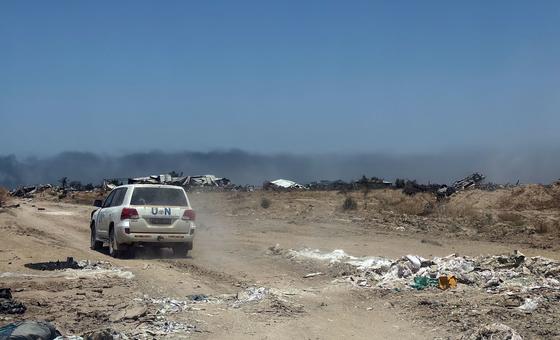“We can confirm that an UNRWA vehicle has been hit in Deir Al-Balah,” a spokesperson confirmed. “So far, we have reports one UNRWA staff member was killed.”
Since the deadly Hamas-led invasion of Israel a year ago triggered the ongoing war, almost 48,000 people in Gaza have been killed during the resulting Israeli offensive, including 230 UNRWA staff members, other humanitarian workers and journalists.
Six UNRWA staff members were among 34 people killed in September when two Israeli airstrikes hit a school-turned-shelter in Gaza.
‘Positive momentum’ in Central African Republic
The Central African Republic (CAR) with the support of the UN peacekeeping mission in the country (MINUSCA), is experiencing much positive momentum from the recent dissolution of active armed groups, according to the UN’s Special Envoy for the country.
Speaking to the Security Council on Wednesday, Valentine Rugwabiza, Special Representative of the Secretary-General for CAR, highlighted the importance of renewing the Mission’s mandate.
MINUSCA was established in September 2014 in the CAR following a deadly flare up of inter-communal violence between the mainly Muslim Séléka groups and the mainly Christian anti-Balaka movement.
Civilians, top priority
Its mandate includes protection of civilians as the “utmost priority” alongside supporting humanitarian operations, protecting and promoting human rights and the disarmament, demobilisation, reintegration and repatriation of fighters from neighbouring countries.
The CAR has struggled to bring a definitive end to armed rebellions and recurrent violence since the start of the civil war in 2013.
Commending recent progress, Ms. Rugwabiza reported the dissolution of six armed groups and three factions of armed groups signatories which were signatories to CAR’s Political Agreement which “remained effective and resulted in the disarmament and demobilisation of their combatants, with the integration of some of them in the national armed forces”.
Ms. Rugwabiza also underscored local elections as a “key component” of the Agreement which “offers a unique opportunity for enhanced governance at a decentralised level”.
Preparations for local elections have also continued to progress driven by the Government’s sustained commitment and MINUSCA multidimensional support.
Guterres strongly condemns terror attack in Türkiye
The Secretary-General has strongly condemned a terrorist attack on the facilities of an aerospace company headquarters based near the capital Ankara which left five dead and 22 reportedly injured.
Wednesday’s assault was carried out by two suspects, a man and a woman, who were later “neutralised” by security forces, according to media reports.
No organization has claimed responsibility for the attack so far, which began with a large explosion at the headquarters of Turkish Aerospace Industries’ facilities, while the attackers opened fire both inside and outside the building.
UN chief António Guterres offered his deepest condolences to the victims and their families and wished a speedy and full recovery to those injured.
“The United Nations stands in solidarity with the people and Government of the Republic of Türkiye,” said a statement issued by his Spokesperson’s Office.
UNESCO warns of growing threats to press freedom through misuse of fiscal laws
In an interview with UN News, an expert from the UN culture agency which monitors press freedom has highlighted growing threats to freedom of expression for media workers.
Guilherme Canela, UNESCO‘s Chief of Section for Freedom of Expression and Safety of Journalists, emphasised on Wednesday that attacks against journalists through the misuse of financial and fiscal legislation are on the rise.
This emerging trend has been revealed in UNESCO’s latest research, which tracks how these laws are being used to harass and silence journalists.
Financial punishments
The study identified 120 cases of journalists being targeted through financial or tax-related charges over the past 20 years, with 60 per cent of these cases occurring in the last three years.
This sharp increase points to a growing trend of using fiscal laws as a tool of legal harassment, particularly against journalists reporting on corruption, elections, and other critical moments for democracy.
Mr. Canela stressed that this tactic not only punishes individual journalists – often with severe fines or imprisonment – but also undermines public trust in journalism. Importantly, the research also notes the likelihood of underreporting, as many cases are obscured by judicial secrecy. This suggests the true scale of the issue could be even larger, he added.

